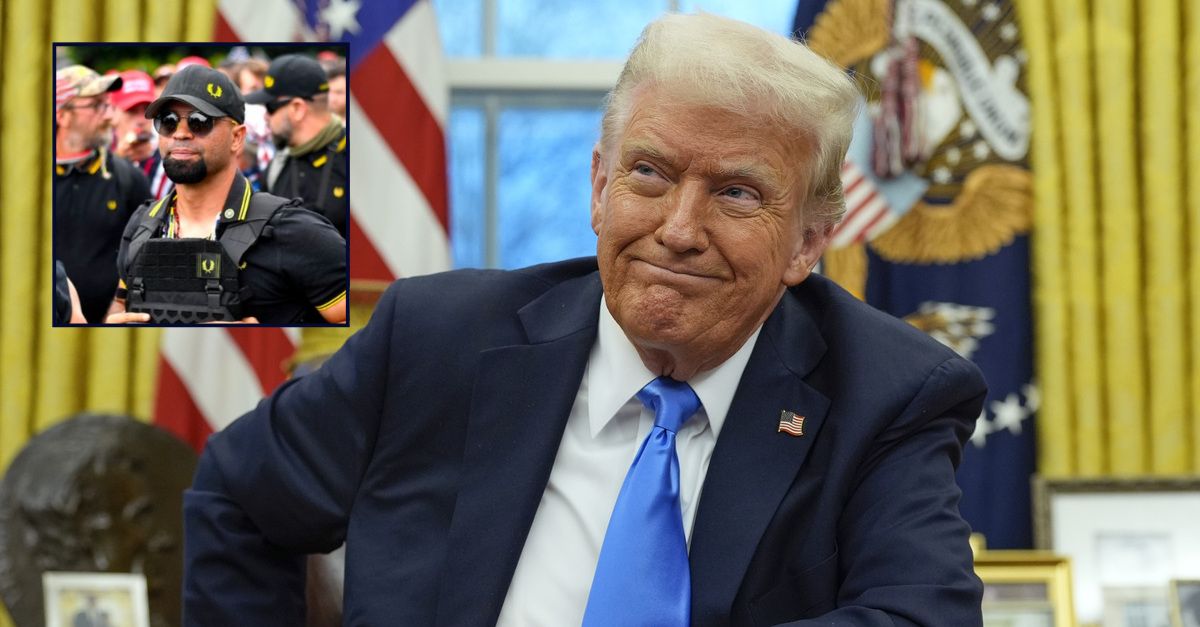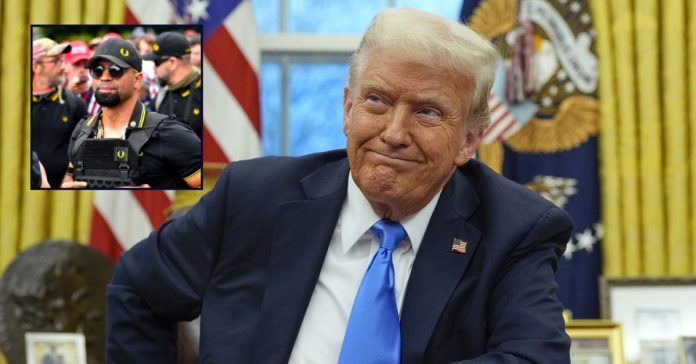
Inset: FILE – Proud Boys chairman Enrique Tarrio rallies in Portland, Ore., on Aug. 17, 2019 (AP Photo/Noah Berger, File). Background: President Donald Trump speaks with reporters in the Oval Office at the White House, Tuesday, Feb. 11, 2025, in Washington, D.C. (Photo/Alex Brandon).
The U.S. Department of Justice on Monday asked a federal judge in Florida to dismiss a $100 million lawsuit filed by several members of the Proud Boys over their federal prosecutions and convictions in the wake of the Jan. 6 attack on the U.S. Capitol Complex.
After being granted clemency by President Donald Trump, five plaintiffs, led by Proud Boys leader Enrique Tarrio, alleged the DOJ and FBI committed “violations of their constitutional rights” in a “political prosecution” over their “alleged participation in the planning of” Jan. 6.
In the dismissal bid, the government points to the particulars.
Four of the plaintiffs, it turns out, only received commutations of their sentences – and they are currently appealing from the final judgments in their criminal cases. The long and short of this state of affairs, the DOJ argues, is that those plaintiffs currently “have ongoing prosecutions.”
Love true crime? Sign up for our newsletter, The Law&Crime Docket, to get the latest real-life crime stories delivered right to your inbox
And in those appeals, the government notes, the plaintiffs – who are also still technically defendants despite any real-world threat to their liberty interests for the crimes in question – are dealing with the same set of facts, as well as the same legal issues, in their lawsuit.
“All claims brought here challenge the underlying convictions,” the DOJ”s motion to dismiss argues. “Thus, the risk of parallel litigation and conflicting judgments is substantial.”
The government says this is not allowed by binding precedent.
The DOJ goes on to cite a 1994 Supreme Court opinion “designed to prevent” someone from being involved in “dual litigation on probable cause and guilt in a criminal case directly and a civil case collaterally.”
But foreclosing parallel litigation on the same facts and issues only applies to the four non-Tarrio plaintiffs – because the onetime Proud Boys leader received a pardon from the 45th and 47th president.
Again, the niceties of clemency control, the government says.
“[A]ny claim brought by Rehl, Nordean, Biggs, and Pezzola must be dismissed because they cannot show termination as their criminal cases are ongoing,” the motion argues. “As for Tarrio, under D.C. law (unlike federal law), a termination of criminal proceedings must be indicative of innocence to be deemed ‘favorable.’ A general pardon does not fit the bill. Thus, Tarrio’s claim fails as well.”
To put a point on it, the government adds: “[F]ederal courts now agree that a pardon does not blot out guilt or expunge a judgment of conviction.”
The DOJ also disputes some of the merits of the Florida-based litigation directly. And, again, binding precedent looms large.
The Proud Boys lawsuit, at a very foundational level, relies on a very specific statute that allows plaintiffs to recover for injuries or damages caused by the wrongs or negligent actions of federal employees. But this statute, the Federal Tort Claims Act (FTCA), is extremely limited and exacting in its application.
The FTCA requires a violation of the “law of the place,” which in the present instance means Washington, D.C. And, in the federal district, asserting a malicious prosecution is a well-worn concept.
To hear the government tell it, the plaintiffs would need to show a prosecutor moved forward with the charges only because “law enforcement applied undue pressure or presented knowingly false or fabricated evidence.” And that, the DOJ says, simply did not happen.
“Here, a grand jury ultimately indicted Plaintiffs,” the motion to dismiss reads. “Prosecutors were obviously involved in presenting the case to the grand jury. The Complaint fails to allege that law enforcement applied undue pressure on the prosecutors. Nor does it specify what false or fabricated evidence was presented to the prosecutors. Thus, Plaintiffs fail to plead sufficient facts to overcome this break in causation and the malicious prosecution claim fails under the first element of the tort.”
The DOJ then doubles down on the evidentiary issue when defending the prosecution on the matter of probable cause. On this issue, of course, the Proud Boys are adamant: the government lacked it.
“Here, the bare allegation that no probable cause existed is a legal conclusion not entitled to an assumption of truth,” the motion goes on. “Otherwise, Plaintiffs make no effort to explain what about probable cause was lacking other than their blanket denials of wrongdoing. That does not suffice. Also, D.C. recognizes the general rule that probable cause determinations by a grand jury or judicial officer create a presumption of probable cause that can only be overcome by allegations, with sufficient factual support, that the determination was obtained by fraud, perjury, or other corrupt means such as misrepresenting or withholding material facts. The Complaint here makes no attempt to explain what evidence supporting the grand jury indictment was knowingly false or fabricated or what material facts were misrepresented or withheld.”
In a secondary and tertiary motion also filed on Monday, the DOJ also defended FBI Agent Nicole Miller against direct claims made against her in the lawsuit and moved to stay any discovery pending the resolution of the motion to dismiss, respectively.

